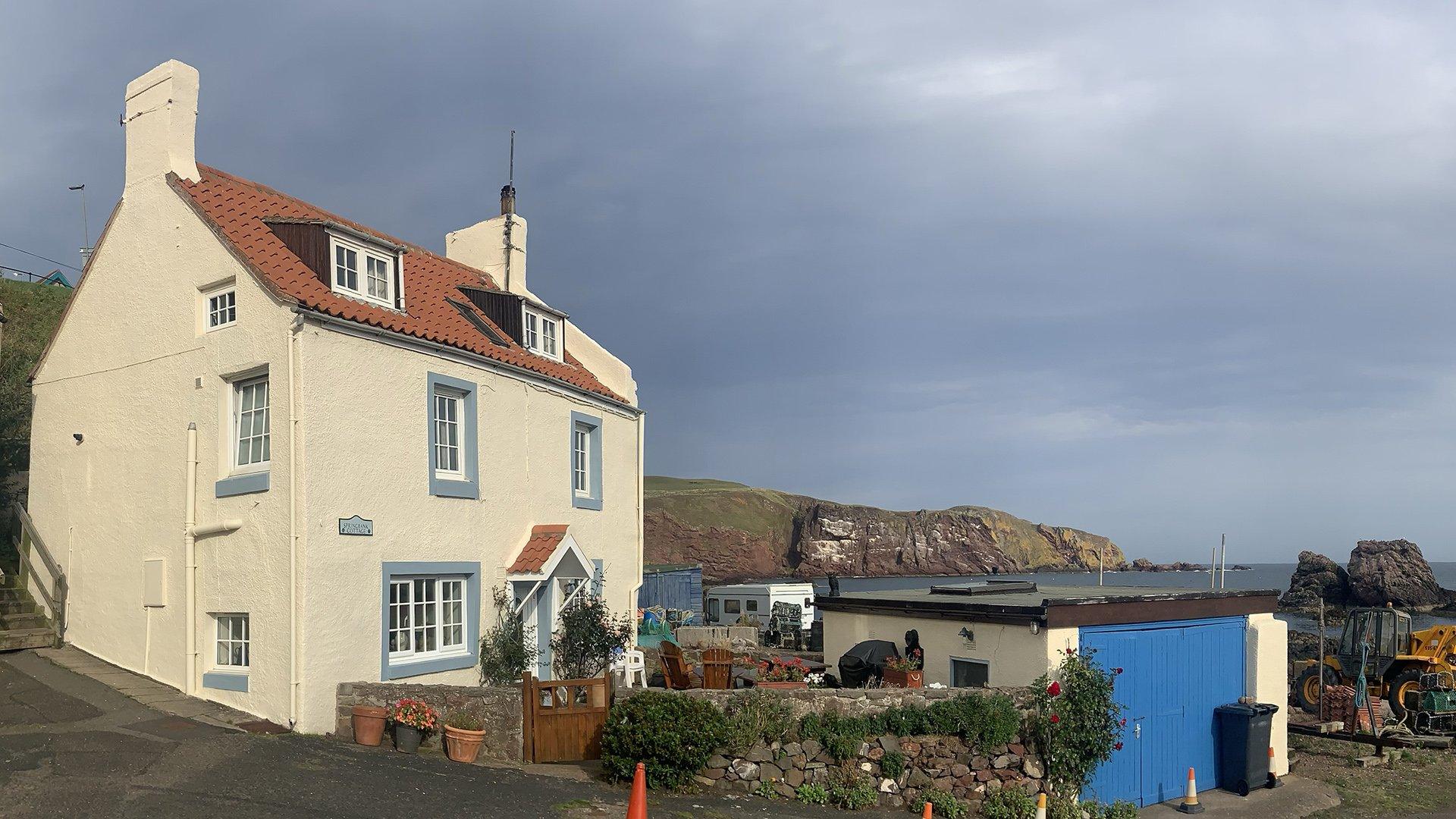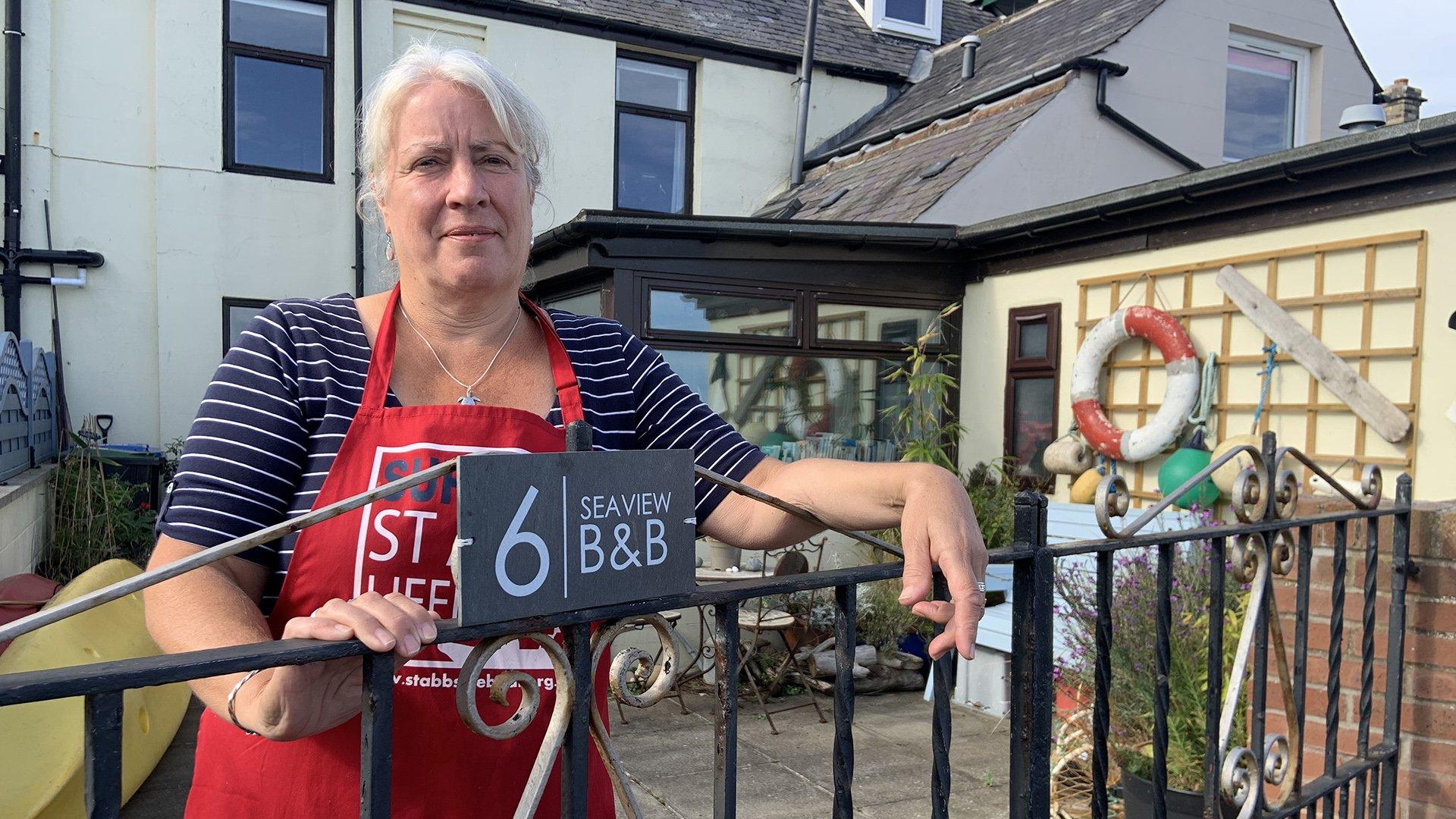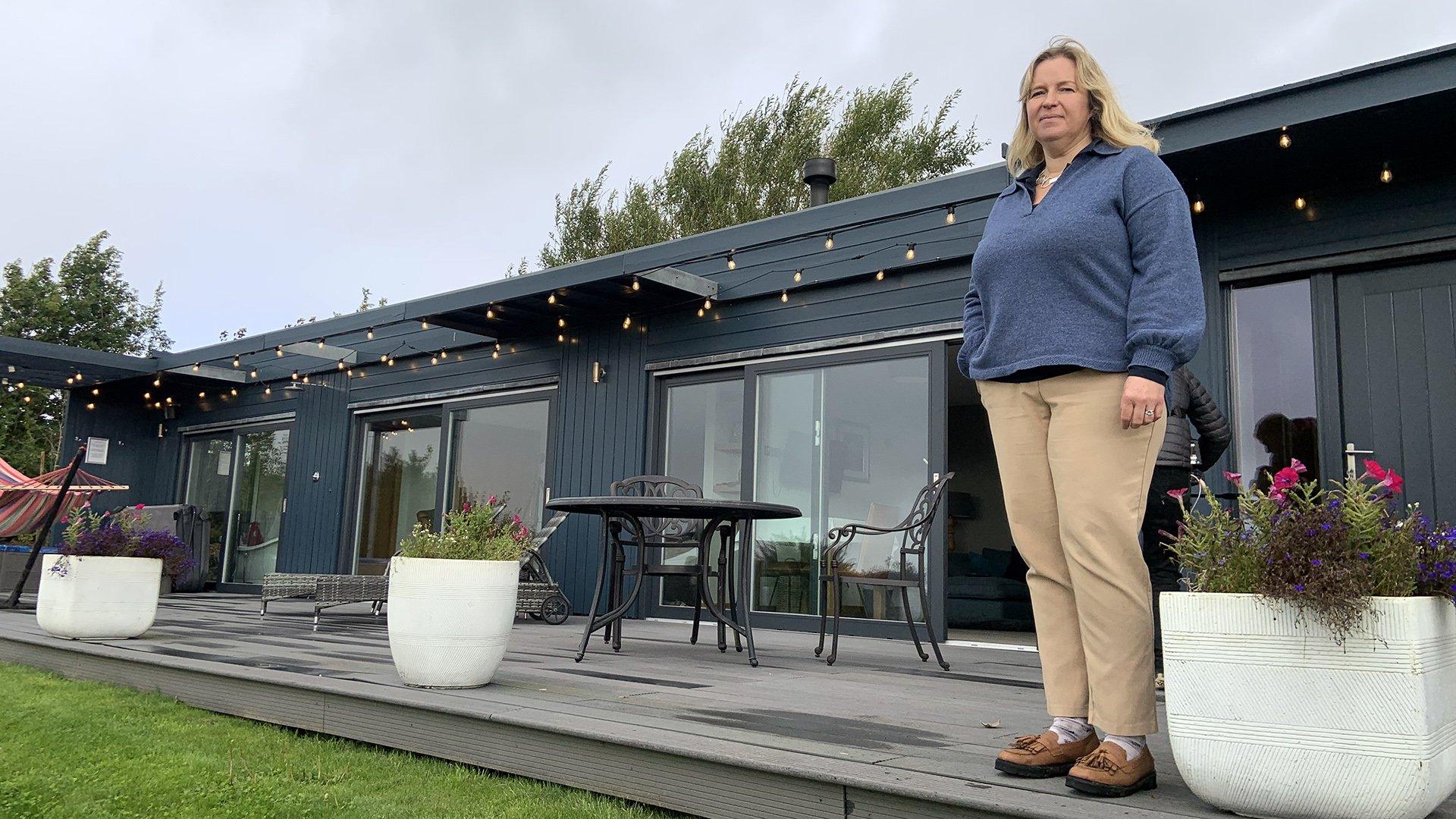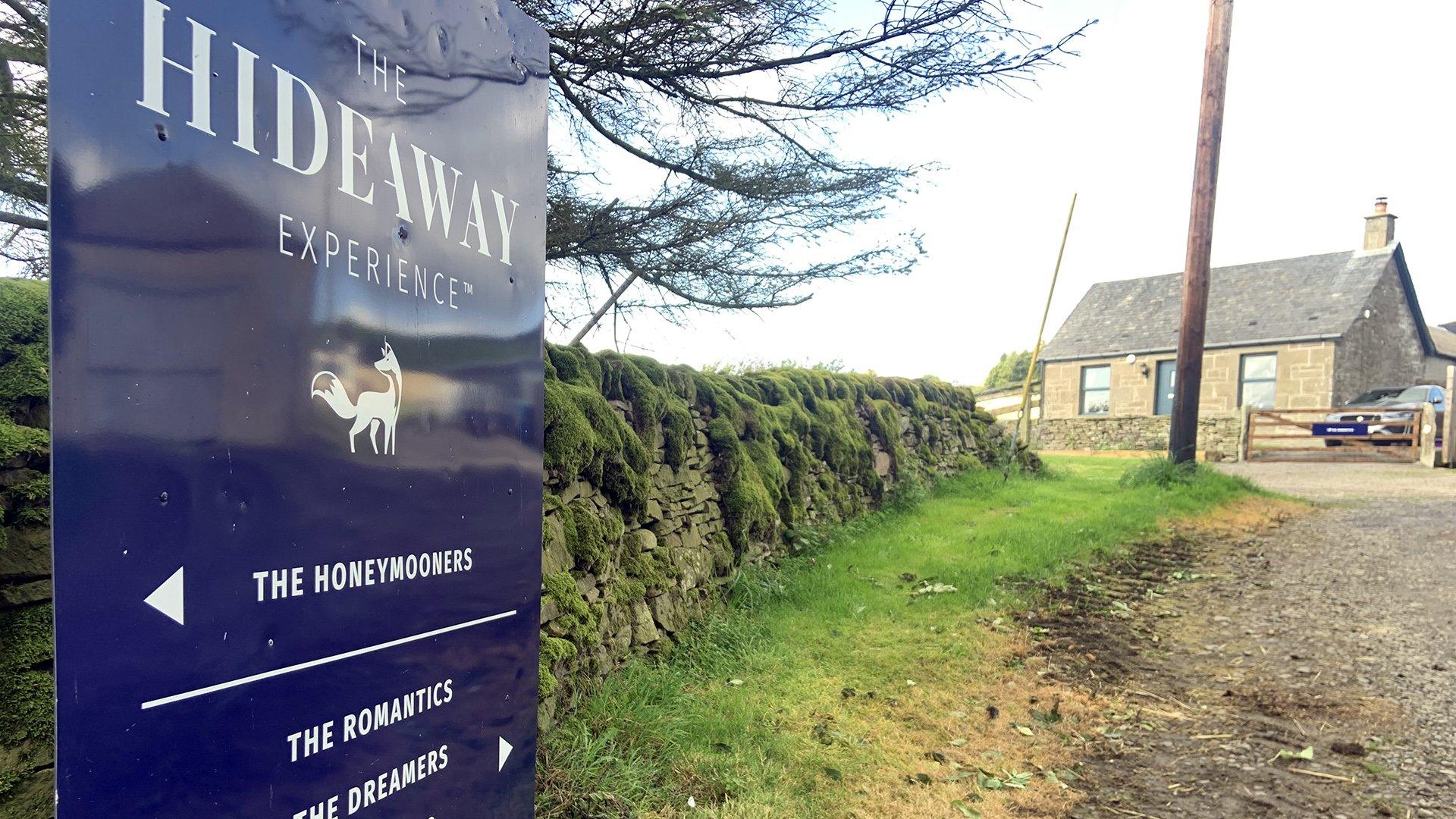Sizzling controversy over short-term lets
- Published

St Abbs was a historic hot spot for short-term holiday lets
Thousands of businesses have to lodge licence applications before Sunday if they're to continue letting short-term accommodation, including bed and breakfasts and extending to house swaps.
The Scottish government says it has consulted enough, and having a licence will be "an attribute" to help a business. But as many as one in nine say they won't comply.
While this informal and dispersed group of property owners are finding a national voice, the implications could be big for the rural economy.
The political controversy around a new licensing regime for short term lets is sizzling like a Full Scottish breakfast.
As September ends, everyone letting out rooms, flats, cottages, yurts or sheds for short-term lets must have applied for a licence. Even if you've arranged a holiday house swap with a friend, the law says you need a licence.
Much of this was driven by the arrival of AirBnB and other booking platforms, connecting customers with any spare space. In Edinburgh and some other urban hotspots, it created a churn of less welcome visitors, some noisy and anti social - the explosive numbers taking the community out of neighbourhoods and tenement stairs.
But this has grown and been extended far beyond the original intention, to cover many small-scale rentals where red tape and cost are resented.
A survey only four days from deadline by the Association of Scotland's Self-Caterers (ASCC) pointed to more than a third who had yet to apply.
One in nine of the 1,367 people respondents said they will not apply.
The ASSC's chief executive Fiona Campbell warns that would mean less capacity, prices going up, and fewer people to spend money on all the other tourism businesses that rely on footfall.
Ruth Hair, who has been the only remaining Bed and Breakfast in St Abbs, is putting up the 'No Vacancies' sign, permanently.

Ruth Hair who has the last remaining BnB in St Abbs is hanging up the 'No Vacancies' sign for good
The Berwickshire coastal village has seen well over a century of summer rentals and guest house landladies. This has long been a source of female income.
"When women get together, they are formidable," says Hair. "The lady who first offered BnB in this house was a suffragist called Isabel Cowe. You don't mess with suffragists."
Ruth Hair is an enthusiast for the BnB personal touch, giving an authentic home experience, making many friends, telling people about the area.
Not any longer. "I'm saying 'no' on principle," she says. "It's not that we couldn't comply: It's that we won't. This is our home."
She already complies with safety requirements, and doesn't see the need for further paperwork to prove it.
She's not alone in closing up, she says. "Our sector is small, quirky, home-based, high-quality. We're being asked to go through a process, with the expenditure, and I feel really strongly that I'm not prepared to do that.
"Now that we're closing the BnB, it makes no difference to the housing problem."
This is literally a cottage industry, but big, widespread, dispersed and now, for some, provoked into action.
Their leaders have called for a pause, to consider replacing a licence regime with lighter-touch registration, as required by landlords with longer-term leases.

Rising numbers of short term lets have taken the community out of neighbourhoods and tenement stairs
Ministers at Holyrood, including the first minister, have delayed already and believe they have consulted long enough.
Either they don't believe the sector surveys, or losing people from the industry is a price worth paying. I asked Holyrood's housing minister, Paul McLennan, which is it?
"We want to see a sector that continues to grow," he says. "The tourism sector is incredibly important. When people see how simple the process is, they'll continue to come forward."
Did I hear that right? Adding cost helps the sector to grow?
"If we have a licenced sector in place, that will be an attribute to businesses and self catering units to say they've got that and can demonstrate that," answers the minister. "Hotels have to demonstrate that. We'll see that in self-catering and BnB."
There is no target for licence numbers, because there is no data yet. That means it will be impossible to know if the policy has been a success. But the minister sounds reassured at the number of applications a week from deadline - around 10,000.
The small-scale tourism industry's complaint is not that safety measures are unnecessary or onerous, but that these are already required. The safety standards are not being raised. The difference is that you'll have to pay for inspections of fire measures, tap water safety and environmental performance.
With councils having won the power to apply rules as they choose, there are 32 different systems, several of them applying gold plating to the legislative pipework.
Some require architects' drawings of each rental unit, at a cost of around £600. Some fire inspectors take issue with antique furniture or require replacement of windows or exit doors. Some councils, including Edinburgh, require planning permission for change of use.

Caroline Millar says similar businesses face different rules and costs depending on the council area
Councils are empowered, under the law, to recover the cost of their licence schemes. The fees differ widely, according to Caroline Millar of Scottish Agri-Tourism - a diversification of farm income that other parts of the Scottish government are keen to expand.
Comparing similar businesses in her farm stay network, she has to pay a fee of £400 for five units in Angus, while the fee for a similar operation in Perth and Kinross is £1600. It's frustrating and unfair for businesses facing very different rules and costs, she says.
Ms Millar has already been through the licensing process for a newly-converted five-star chalet near her family farm north of Dundee. For new properties, the application deadline was last year.
While the application could not be lodged until every certificate was in place, she was not allowed to take advance bookings. That lost her the 2023 high season, and around £12,000 in revenue.
Paul McLennan does not accept there is such wide variety of costs for similar businesses. Council officials tell him the price is between £250 and £450 for a small rental unit. It's only £5 a week, he says.
But under pressure from sector representatives, he has written to councils urging them to be flexible about application of the law, while he defends the decision to let councils respond to local conditions.

Mr McLennan's constituents in East Lothian will want to know how that will apply when the Open Championship next comes to Muirfield golf course. The licence requirement can be lifted when a big, one-off event comes into view, and East Lothian makes a lot of money out of renting property when high-rolling golfers arrive.
The same question mark hangs over the capital's residents, many of whom earn good money from renting a room or their whole home during the festivals in August, and that in turn lets the city flex its capacity for that vast influx of performers and audiences.
Such questions keep arising. It's hard to think of a government policy that has raised so many unintended consequences.
To Fiona Campbell, ministers have been warned about the problems with their plans for at least three years. So she assumes these consequences must be intended, and they just don't care.
Under Humza Yousaf's leadership, the Scottish government says it will listen and consult in a 'new deal for business' more widely.
That came with a halt to difficult policies, on bottle deposit and return and a proposed ban on promoting alcohol.
But licensing of short term lets goes on, because it was enacted before the 'new deal' was struck. A review is promised early next year, hinting that ministers realise this may have to be revisited, and fast.
